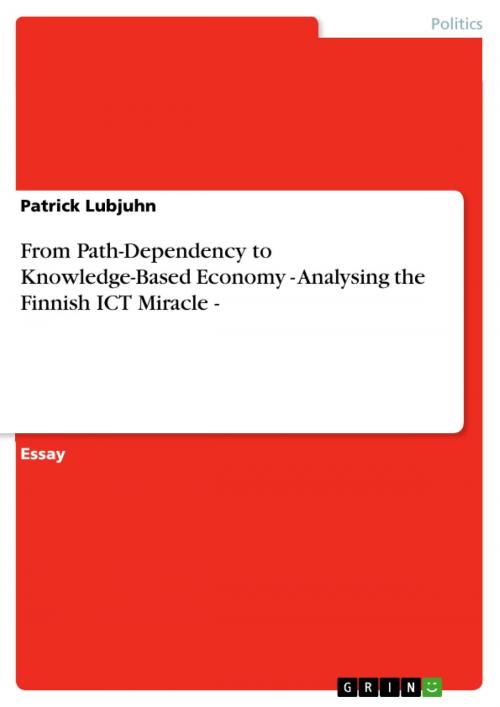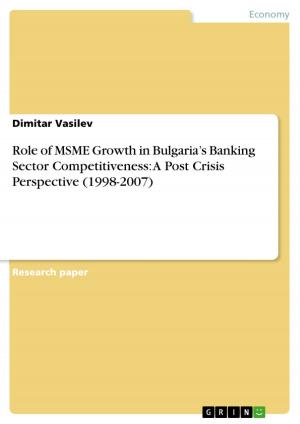From Path-Dependency to Knowledge-Based Economy - Analysing the Finnish ICT Miracle -
Analysing the Finnish ICT Miracle -
Nonfiction, Social & Cultural Studies, Political Science| Author: | Patrick Lubjuhn | ISBN: | 9783638514774 |
| Publisher: | GRIN Publishing | Publication: | June 29, 2006 |
| Imprint: | GRIN Publishing | Language: | English |
| Author: | Patrick Lubjuhn |
| ISBN: | 9783638514774 |
| Publisher: | GRIN Publishing |
| Publication: | June 29, 2006 |
| Imprint: | GRIN Publishing |
| Language: | English |
Essay from the year 2005 in the subject Politics - International Politics - Topic: Globalization, Political Economics, grade: 1,7, University of Münster, course: European Economic Policy Course, 14 entries in the bibliography, language: English, abstract: The fact that Finland is far away from the centres of European economic activities, for example the so-called blue banana, the Sunbelt and the Industrial axe, its relative economic success, especially in the field of information and communication technologies (ICT) makes it so interesting to analyse what is so characteristic for the 'Finish-ICT Miracle', as Paija (2001) has called it. During the last decade, Finland has become one of the world's most successful technology-intensive countries, finding itself in the front rank of the world's digital economies. In a decade, Finland went from being one of the least information and communication technologies specialized countries to become the single most specialized one. 'Currently the Finnish ICT sector, with Nokia as its locomotive, consists of some 6 thousand firms and accounts for approximately 10 percent of Finland's GDP' (Rouvinen & Antilla 2003, p.87) and therefore have put Finland on the map of global economies. Determining for this 'raise' of Finland is the development of a new growth path in this small Nordic country. Finland has managed to transform itself from a resource-based into a knowledge-based economy in a rather short period of time, especially without any major cutbacks in his highly developed welfare state system. The essential point of analysis in my essay deals with the question, how Finland managed to become one of the most successful ICT-countries in the world. How was it possible for this small Nordic country to go through a structural change from forestry to ICT? Nowadays, 'about 6000 firms (mostly small and medium-sized) and 200 electronics manufacturing services companies make up the so called 'ICT cluster'. Some 350 of them are first-tier suppliers to Nokia, and represent the 'Nokia network'' (Daveri & Silva 2002, p.9). So I will start my analysis by defining structural change to create a basic which is necessary to understand the whole process. With the use of statistical data I will then try to explain Finland's way from forestry to ICT. A central aspect of the recent Finnish ICT-cluster is the importance of the mobile telecommunication industry with its driving engine, Nokia. This is analysed in part three. And finally of course, my essay ends up with a conclusion, summing up all the relevant information which is necessary to explain how Finland has turned into a knowledge-based economy.
Essay from the year 2005 in the subject Politics - International Politics - Topic: Globalization, Political Economics, grade: 1,7, University of Münster, course: European Economic Policy Course, 14 entries in the bibliography, language: English, abstract: The fact that Finland is far away from the centres of European economic activities, for example the so-called blue banana, the Sunbelt and the Industrial axe, its relative economic success, especially in the field of information and communication technologies (ICT) makes it so interesting to analyse what is so characteristic for the 'Finish-ICT Miracle', as Paija (2001) has called it. During the last decade, Finland has become one of the world's most successful technology-intensive countries, finding itself in the front rank of the world's digital economies. In a decade, Finland went from being one of the least information and communication technologies specialized countries to become the single most specialized one. 'Currently the Finnish ICT sector, with Nokia as its locomotive, consists of some 6 thousand firms and accounts for approximately 10 percent of Finland's GDP' (Rouvinen & Antilla 2003, p.87) and therefore have put Finland on the map of global economies. Determining for this 'raise' of Finland is the development of a new growth path in this small Nordic country. Finland has managed to transform itself from a resource-based into a knowledge-based economy in a rather short period of time, especially without any major cutbacks in his highly developed welfare state system. The essential point of analysis in my essay deals with the question, how Finland managed to become one of the most successful ICT-countries in the world. How was it possible for this small Nordic country to go through a structural change from forestry to ICT? Nowadays, 'about 6000 firms (mostly small and medium-sized) and 200 electronics manufacturing services companies make up the so called 'ICT cluster'. Some 350 of them are first-tier suppliers to Nokia, and represent the 'Nokia network'' (Daveri & Silva 2002, p.9). So I will start my analysis by defining structural change to create a basic which is necessary to understand the whole process. With the use of statistical data I will then try to explain Finland's way from forestry to ICT. A central aspect of the recent Finnish ICT-cluster is the importance of the mobile telecommunication industry with its driving engine, Nokia. This is analysed in part three. And finally of course, my essay ends up with a conclusion, summing up all the relevant information which is necessary to explain how Finland has turned into a knowledge-based economy.















